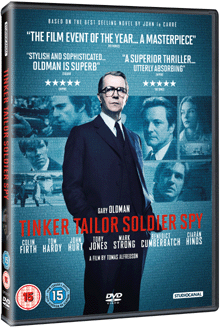 It’s unusual for us to review films, but then Tinker Tailor Soldier Spy is an unusual film.
It’s unusual for us to review films, but then Tinker Tailor Soldier Spy is an unusual film.
Unashamedly for grown-ups, the 2011 espionage thriller is a stylish and intelligent account of John le Carré’s novel, telling the story of the ‘Circus’, the hub of British Intelligence, and the investigations of George Smiley, an agent brought out of retirement to uncover the double agent within.
Set in 1973, Swedish director Tomas Alfredson’s film articulates a time when Britain was a poor relation on the world stage, nursing distant memories of a war which, for some, had given them a definition and an identity, now lost amid a thousand betrayals, personal and political.
Every scene is shot through with a kind of languidness, and everyone looks so tired. Even the pictures seem stained with cigarette smoke, the exteriors set in Britain almost indistinguishable from those set in Eastern Europe.
It’s a world where the once beautiful boys of the British Intelligence Service are necessarily marginalised figures, on the outside looking in, trained to keep life at a distance, as the camera, too, operates with a voyeuristic intent. Repeatedly, the action is glimpsed through windows, doors and hatches, while, in one remarkable moment, the camera pans back from the levels and departments of the circus, to render the people inside like the kings, queens and knaves of a playing card house.
In this world, integrity is bedfellow with compromise. Even those agents who behave with what passes for probity in their professional lives, such as Benedict Cumberbatch’s Peter Guillam, are forced to make traitors of their private selves. In one of the film’s best moments, there’s a dumb show of three short scenes as he wordlessly dumps his boyfriend, having let his private life take the bullet for the cause.
In this, he bears comparison with Colin Firth’s Bill Haydon: a man who pursues a heterosexual affair; but who, in his relationship with Mark Strong’s Jim Prideaux, from whom he is said to be inseparable, operates with the kind of exclusivity that inevitably raises question marks.
As the film often reminds us, betrayal and double-dealing can be the currency of the domestic sphere too, and the compromises and silences of life in the Circus erode, and make ambiguous, the lives of all who work there.
No one character embodies this inscrutability better than Gary Oldman’s George Smiley: a man who has long since learned to hide the biggest of emotions behind the tiniest flickers of wry sardonicism.
Oldman’s voice alone blows smoke rings around the rest of the exemplary cast. If we say that Smiley has a jeweller’s eye for secrets, scrutinising them to determine what is ersatz and what is gem, it’s not to confuse the metaphor. It’s because the film inspires metaphor. There’s a poetic quality to the storytelling, which is beguiling.
It is a riddle presented as an enigma, and has the seemingly effortless cool that you’d expect from a Canal Plus co-production.
But just as poetry makes you work to access meaning, so this film does too, favouring a non-linear narrative which passes between past and present without always clarifying the two.
Memory is the agent of meaning here, and the clues are hidden in the social dynamics of a remembered office party, revisited from the points of view of different characters at different points in the film, where relationships wordlessly and brutally implode.
For a film that takes as its subject British Intelligence, there’s no denying that intelligence, and an assiduous attention span, is precisely what’s needed to watch it. Ultimately, not all questions are answered. Even so, there is a highbrow delight in seeing a film which so coolly wears its brain on its sleeve, and which succeeds in quickening the mind, if not always the pulse.
![]()
Released on DVD and Blu-ray on Monday 30th January 2012 by StudioCanal.
> Buy Tinker Tailor Soldier Spy on DVD on Amazon.
Watch the trailer…

